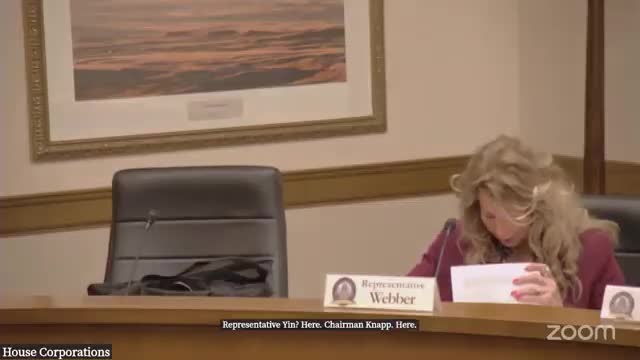Wyoming committee advances bill declaring certain out‑of‑state driver credentials invalid for unauthorized immigrants
Get AI-powered insights, summaries, and transcripts
Subscribe
Summary
The Corporations, Elections & Political Subdivisions Committee advanced House Bill 116, which would bar Wyoming recognition of out‑of‑state driver credentials issued to people the bill describes as "unauthorized aliens." Agencies and civil‑liberties and faith groups testified for and against the measure; it passed the committee 8–1.
The Corporations, Elections & Political Subdivisions Committee advanced House Bill 116 on a roll call vote after hearing sponsor remarks, agency testimony and public comment.
Representative Ottman presented the bill as a measure to bar Wyoming from recognizing driver’s licenses and similar credentials issued by other jurisdictions to people the bill defines as “unauthorized alien[s].” “This bill specifies that driver's licenses issued by other states to illegal immigrants are invalid in Wyoming,” Representative Ottman said during his presentation.
The bill would create a new statutory section saying a driver's license or nonresident operating privilege document issued by another jurisdiction that indicates the cardholder “does not have lawful presence in the U.S.” is invalid in Wyoming. The measure also amends related Wyoming driver‑licensing provisions to make exemptions inapplicable where a license is invalid under the new section, adds a driving prohibition if a license is deemed invalid, grants rulemaking authority to the Wyoming Department of Transportation and sets an effective date.
Why it matters: sponsor and supporters said the bill preserves the strength of Wyoming identification documents and prevents use of certain out‑of‑state credentials for purposes such as voter identification. Opponents warned it could harm public safety and tourism and raised constitutional and enforcement concerns.
Agency testimony: Misty Zimmerman, program manager for driver services at the Wyoming Department of Transportation, told the committee the bill “does not change how Wyoming currently issues our driver's license” and that Wyoming already requires proof of legal presence at application. She said the bill addresses recognition of out‑of‑state credentials and noted many jurisdictions issue “driver privilege” cards that may not be clearly marked and therefore would be difficult for law enforcement to identify on stop.
Lieutenant Colonel Carl Germaine of the Wyoming Highway Patrol said officers currently treat valid out‑of‑state licenses as valid for roadside enforcement and that determining lawful presence may require an immigration inquiry routed through dispatch and federal systems, which can add time to traffic stops. “When we encounter that today, it's treated as a valid driver's license, and you move on with the enforcement activity,” he said, adding some jurisdictions clearly mark privilege‑only cards while others do not.
Public testimony: Antonio Serrano, advocacy director for ACLU of Wyoming, testified in opposition, saying the bill would not make roads safer and could harm tourism and local economies. “By expanding access to driver's license for undocumented residents, other states have helped increase safety on the roads,” Serrano told the committee. Deacon Michael Lehman of the Catholic Diocese of Cheyenne urged caution and reminded members about human dignity and the effect on families already in Wyoming.
State official comment: “I'm in full support of providing a clear statement as a state that driver's licenses issued to illegal immigrants are not valid for any purpose,” said Secretary Gray in testimony supporting HB 116.
Committee questions and enforcement concerns: Committee members pressed the sponsor and witnesses on how law enforcement would distinguish marked and unmarked privilege cards, whether out‑of‑state license validity is indicated in databases, and whether routine traffic stops would require immigration inquiries. Zimmerman and Germaine said database returns show whether a license is valid but not always the reason; a jurisdictional driving inquiry may be required for more detail, which can take 15–30 minutes or longer.
Vote: The committee recorded the bill as passed by a roll call vote of 8 ayes and 1 no (Representative Yin recorded as no). The committee recorded the outcome as "approved." The committee did not adopt amendments during the hearing.
What remains: The bill moves from committee to the full House for further consideration. The committee record shows both support from state officials and opposition from civil‑liberties and faith community witnesses, and witnesses flagged enforcement complexity if out‑of‑state cards are not consistently marked.
Ending: The committee's recorded vote advances HB 116 to the next stage; the Legislature’s floor calendar will determine when the full House debates the bill.
